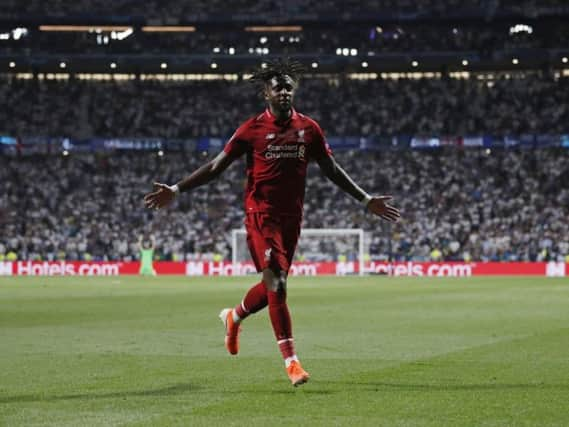Tottenham 0-2 Liverpool: Salah and Origi seal Champions League win 12 months after agony in Kiev


Mohamed Salah’s penalty set them on their way after two minutes before, appropriately, Divock Origi sealed the win with three minutes remaining.
The Belgian has scored only seven goals this season but they have tended to be important: two were late winners, two came against Barcelona and then this one, that sealed Liverpool’s sixth European title and meant that they finally secured some tangible reward for a season in which they have played some extraordinary football.
Advertisement
Hide AdAdvertisement
Hide AdNot that there was much extraordinary football here. As English sides have shown signs of dominating Europe as they did 40 years ago, reinvoking the style of those days, so they produced a throwback of a final, tight and cautious that for a long time looked likely to be settled by a single goal.
The game could hardly have got off to a more dramatic start. Only 24 seconds had elapsed as Tottenham became the latest side undone by Uefa’s extremely strict interpretation of the handball law.
Moussa Sissoko was unfortunate that Sadio Mane’s flick cannoned off his chest onto his upper arm, and, although his arm was raised, the penalty probably would not have been given in the Premier League, but Damir Skomina’s decision to point to the spot was entirely in keeping with how the law has been enforced in the Champions League this season.
Salah thumped the penalty down the middle as Hugo Lloris fell away to his left.
Tottenham are used to going behind early in Europe: it was the 18th goal they have conceded in the Champions League this season and the eighth to have come in the first 15 minutes of games.
But neither they nor Liverpool found anything like the rhythm of which they are capable and the early excitement soon yielded to more bitty fare. Passes were misplaced, poor decisions taken, shots skewed wide, there was a general lack of intensity – both sides, to be frank looked rusty, which perhaps isn’t surprising given the three-week break since the end of the league season.
Harry Kane, playing his first game since suffering an ankle injury in the first leg of the quarter-final victory over Manchester City, was a controversial if not unexpected starter ahead of Lucas Moura, hat-trick hero of the semi-final. The England striker, though, was largely ineffective, winning nothing against Virgil van Dijk and only occasionally looking dangerous when dropping deep. Whether that was to do with his physical condition, though, or a result of the general torpor was difficult to say. When Lucas was introduced, in the 66th minute, it was for Harry Winks, another who had not played since that quarter-final first leg against City.
By then Tottenham were chasing the game and the compromise was to drop the hitherto anonymous Christian Eriksen back. He was more influential in the deeper role but the game by then was beyond saving; nobody could bring cohesion amid the scrappiness. Tottenham created a handful of chances – a long-range drive from Son Heung-min, an off-balance chip from Dele Alli, a scuffed Lucas shot, an Eriksen free-kick – but there was no sustained pressure, never a sense of the sort of battering that ultimately led Ajax to collapse in the semi-final.
Heroic comebacks can only be sustained for so long.
Advertisement
Hide AdAdvertisement
Hide AdPochettino, whose belief in the importance of positive energy might not be so surprising were it not allied to more far-reaching theories about universal forces, had his players go through a series of bonding exercises last Wednesday. They walked over hot coals, ran into walls with arrows pressed to their throats, and told alternate dull and exciting stories with contrasting body language, all to build positive thinking. That’s all very well but all the positivity in the world means little if basic passes go astray.
Not that Liverpool were much better; but having got the early goal there was far less imperative on them to produce anything in the way of fluency. They held Tottenham at arm’s length and that was enough. A team that has built its reputation on the thrilling incisiveness of their football ended up claiming its first triumph with a performance of grim resilience.